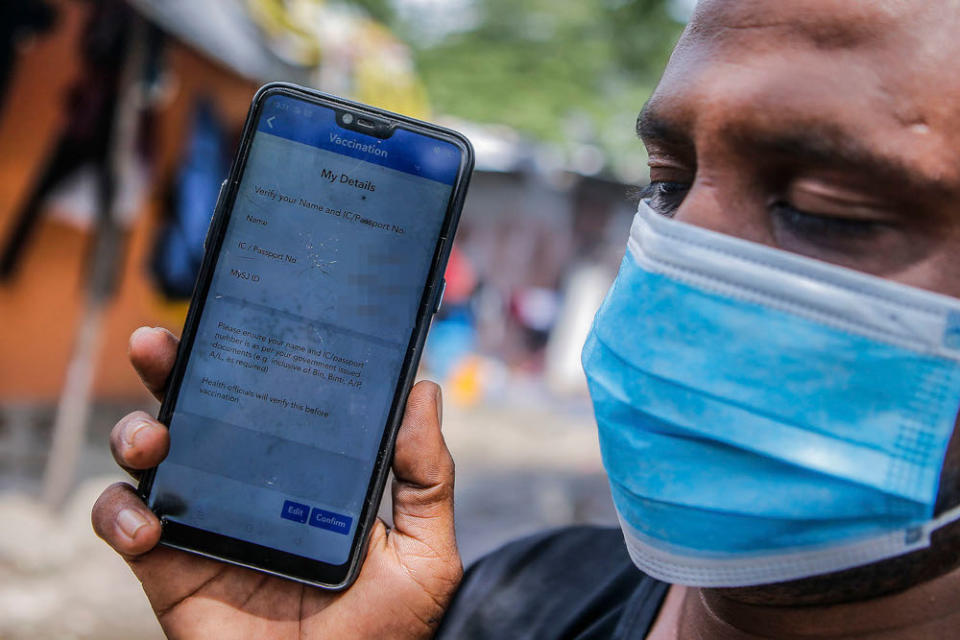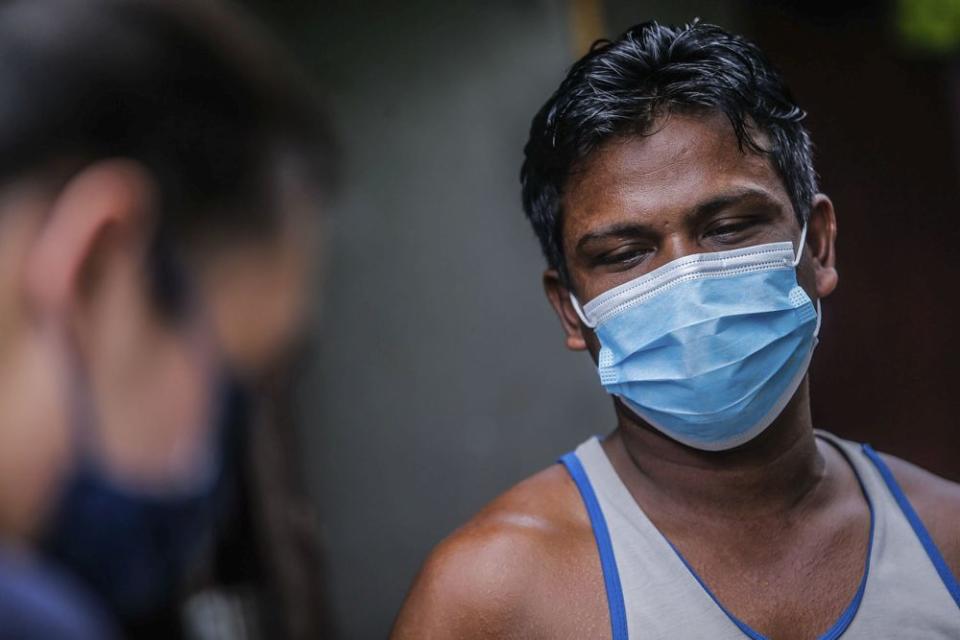With the National Covid-19 vaccination programme in full swing, Rohingyas living in Malaysia being left behind

KUALA LUMPUR, June 16 — As the National Covid-19 Immunisation Programme (NIP) picks up speed around the country, one group of people are not even sure when they will get vaccinated.
The Rohingyas — a minority group of Myanmar Muslims once described by United Nations Secretary-General Antonio Guterres as “one of, if not the, most discriminated people in the world” — are refugees who have been in Malaysia since the 1970s but the biggest influx came in 2017 after the military crackdown in Myanmar.
There are some 150,000 Rohingyas in the country and the Bandar Baru Sentul settlement here is pretty typical of how they live. Made up of dilapidated shacks, the Rohingya refugees here eke out a meagre living while keeping a wary eye for the authorities.
For 43-year-old Hassan, the occasional brush with the law is routine and expected even though he (and his fellow Rohingyas) possesses United Nations High Commission For Refugees (UNHCR) documentation.

When asked whether the authorities have given them any trouble lately, Hassan replied in the negative but spoke of the routine spot-checks conducted by the police on MCO standard operating procedures (SOPs) instead.
“Well, they just come around occasionally and make sure we’re all masked and making sure we socially distance ourselves... that’s all,” he said, while chewing betel.
The Rohingyas, unlike their fellow documented South-east Asian migrant counterparts, are viewed with particular prejudice here due to the stigma surrounding them and the spread of Covid-19.
The Immigration Department shared a Facebook post just last week supporting anti-Rohingya sentiments. It has since been deleted.
A caption on the picture written in Bahasa Malaysia reads Migran etnik Rohingya kedatangan anda tidak diundang, which translates to, “Ethnic Rohingya migrants, your arrival is unwelcome.”
On June 12, the Home Ministry said it has requested that UNHCR hand over the list of refugees in the country for the purpose of Covid-19 vaccinations. Some have presumed this to be a way of obtaining data to conduct further crackdowns.
Minister Datuk Seri Hamzah Zainuddin explained that Malaysians must understand that for the country to reach herd immunity, every foreigner in Malaysia must be vaccinated.
Asked if he would agree to getting vaccinated should an opportunity arise, Hassan merely nodded but in a hesitant manner, as if knowing full well that Rohingyas are not welcome here.
Sharing Hassan’s sentiment is another of his compatriots, 24-year-old Abdul Hamid who also wished to be part of the national vaccination campaign but expressed anxiety that he may be arrested by the authorities.

According to Abdul, the last immigration raid conducted was in March last year several days before the first MCO went into effect.
“All of us here are documented (with UNHCR cards) so those who do not have them have all been taken to the detention depot. They (the authorities) try to leave us be unless they receive complaints filed by others,” he said.
Like Hassan, Abdul also has minimal or zero knowledge of the government’s ongoing Covid-19 vaccination programme.
He does not know about the vaccination tab on his MySejahtera app which he only understood as a formal requirement to check-in for contact tracing purposes.
He laughed nervously when asked if he was afraid of getting detained during vaccination and only briefly muttered “Insyallah (God willing)” behind the face mask he was wearing.
Unlike Hassan and Abdul, 31-year-old Ali Hussain who has a family — a wife and two children — lamented the predicament faced by the community especially in obtaining vaccination against Covid-19.

Despite having a limited vocabulary, Ali understood the basics of the ongoing vaccination programme and expressed hope that his family would be able to be inoculated like others.
However, he remained hesitant of venturing outside for assistance as his children’s application as UNHCR cardholders remained in limbo following the nationwide lockdown which has led to temporary suspension of all ongoing applications.
“We have the UNHCR documents, so I think we should get vaccinated but no one is willing to help us,” he said, wary of possible checks by the authorities but not to the point of dreading them.
Vaccinate migrants irrespective of their immigration status to achieve herd immunity
Beyond Borders executive director Mahi Ramakrishnan said refugees, irrespective of whether or not they have UNHCR documentation, must be vaccinated to achieve the desired herd immunity in the country.
“But I wonder how this is going to be possible when Immigration is ‘waging a war’ against the Rohingya and undocumented migrant workers.
“Refugees are fleeing internal persecution in their countries. Migrant workers cross the border to make a better living and end up without papers through no fault of their own. We have a raging pandemic at hand.
“And so, this is not the time to pick on whether someone has documents on them, is stateless or is still waiting for their cards from the UNHCR,” she told Malay Mail.
She stressed that the government needs to impose a moratorium on rounding up vulnerable people as efforts to coax refugees and migrant workers to get vaccinated are dampened due to fear of arrests and detention.
“The Immigration Department must stop rounding up migrants and also the Rohingya or any other refugee for that matter.
“The government must collaborate with NGOs that work on the ground to get refugees and migrant workers vaccinated.
“And one doesn’t need to round them up to ensure the vaccination process can happen. That’s a regressive strategy that won’t help anyone,” she said.

As for the anti-Rohingya sentiments advocated by the authorities, Mahi agreed that such acts have fuelled more negative perceptions about the Rohingyas and backlash against the group has intensified since the lockdown began last year.
“We can see that from the response by fellow Malaysians on social media platforms. The hate and xenophobia is mind-boggling.
“It’s almost like the pandemic has exposed how ‘ugly’ we are as a nation,” she said.
Tenaganita executive director Glorene A. Das too agreed that refugees, asylum seekers and stateless individuals — inclusive of the Rohingya communities — should be vaccinated.
“In my humble opinion, all must be vaccinated regardless of legal status.
“As I had mentioned before, Covid-19 does not discriminate, it affects everyone... as such we must vaccinate everyone,” she said.
She also urged the UNHCR to furnish the necessary information to the Home Ministry of the 178,715 UNHCR cardholders out of some 2.5 million foreigners living in the country who held various documents issued by the government or third parties for Covid-19 vaccination to be facilitated.
Zafar Ahmad Abdul Ghani who heads the Myanmar Ethnic Rohingya Human Rights Organisation Malaysia (Merhrom), however, declined to comment on the matter when contacted.
In a brief text message, he apologised and pointed towards continuous death threats he has received following false accusations which have been making the rounds on social media since last year.
In April, news agency Reuters reported that Zafar has not left his home on the outskirts of Kuala Lumpur for nearly a year, after misinformation spread online that he had demanded Malaysian citizenship, triggering a wave of hate speech and death threats against him and his family.
Related Articles Singapore evaluating easing of restrictions after new Covid-19 cluster EU approval of Russia’s Sputnik V vaccine delayed, sources say Indonesia reports 9,944 new coronavirus daily infections



